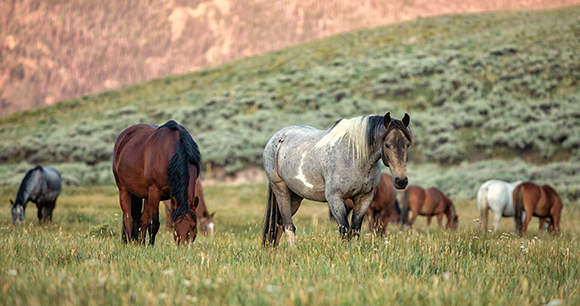
Language prohibits slaughter, rejects mass equine transfers to foreign governments, and affirms congressional oversight of the BLM’s Wild Horse and Burro Program
Washington, DC—Today, the Animal Welfare Institute (AWI) and American Wild Horse Conservation (AWHC) commend the US House Committee on Appropriations for advancing bipartisan language in its fiscal year 2026 Interior, Environment, and Related Agencies funding bill that continues to prohibit the slaughter of wild horses and burros.
The organizations are now urging the full committee to join 100 bipartisan members of Congress in directing the Bureau of Land Management (BLM) to prioritize humane fertility control as an alternative to the costly and inhumane roundup-and-removal system. The committee is scheduled to mark up the bill later this week.
The committee rejected the president’s recent budget request, which notably failed to include longstanding prohibitions on lethal management and commercial slaughter of federally protected wild horses and burros. This omission signaled a potentially dangerous shift in federal policy and sparked widespread public opposition. The budget’s proposed language would have also allowed for the large-scale transfer of wild horses and burros to foreign countries such as Canada and Mexico, where horse slaughter facilities continue to operate.
The House bill appropriates $144 million for the BLM’s Wild Horse and Burro Program and rejects efforts to allow the BLM to transfer animals outside the public eye. Horse transfers will be limited to federal, state, or local agencies for use as work animals, and prohibitions remain in place against the destruction of healthy horses and burros or their sale for slaughter.
“We applaud the House Appropriations Committee for including provisions in the FY26 Interior bill that bar the slaughter and lethal control of wild horses and burros,” said Joanna Grossman, Ph.D., equine program director for AWI. “These longstanding protections, which had been removed in the administration’s proposed budget, reflect the will of the American people who want to see these iconic animals protected, not butchered at slaughter plants. This bill makes it clear—America’s mustangs don’t belong on anyone’s dinner plate.”
“The House bill reaffirms congressional intent to prohibit slaughter and reflects the values of the American people,” said Suzanne Roy, executive director of AWHC. “We especially commend Rep. Juan Ciscomani for his leadership in making clear that mass killing is not the answer to federal mismanagement of our nation’s wild horses and burros.”
AWI and AWHC have been advocating an expansion of humane fertility control funding within the BLM’s budget. Despite previous congressional directives, the BLM has allocated less than 4% of its budget to humane fertility control, opting instead to continue business as usual.
AWHC’s fertility control program on Nevada’s Virginia Range near Reno served as the foundation for a peer-reviewed scientific study confirming the effectiveness of fertility control in managing large wild horse populations across vast, rugged habitats.
Over the past five years, AWHC’s fertility control programs in both state-managed and federal herds have delivered more than 10,000 treatments—more than twice the number administered by the BLM during the same period—demonstrating the scalability and effectiveness of humane, on-range wild horse management.
The House bill’s release coincides with the introduction of the Wild Horse and Burro Protection Act of 2025, led by Rep. Dina Titus (D-NV) and co-sponsored by Reps. Juan Ciscomani (R-AZ) and Steve Cohen (D-TN), all of whom are co-chairs of the bipartisan Congressional Wild Horse Caucus. The bill would phase out helicopter roundups over two years and require cameras on helicopters to improve public oversight. In June, the co-chairs of the Wild Horse Caucus and Animal Protection Caucus wrote to House and Senate Appropriations Committee leadership, urging them to maintain prohibitions against slaughter and lethal control.
The House Interior Appropriations Subcommittee will hold its markup hearing on the bill tomorrow at 10 a.m. ET. The timing coincides with the BLM’s launch of a large-scale helicopter roundup in Wyoming’s Adobe Town Herd Management Area, which will add over 1,600 wild horses to the 62,000 wild horses and burros currently confined in BLM’s holding facility.
Marjorie Fishman, Animal Welfare Institute
[email protected], (202) 446-2128
Amelia Perrin, American Wild Horse Conservation
[email protected], (919) 619-4913
The Animal Welfare Institute (awionline.org) is a nonprofit charitable organization founded in 1951 and dedicated to alleviating animal suffering caused by people. We seek to improve the welfare of animals everywhere: in agriculture, in commerce, in our homes and communities, in research, and in the wild. Follow us on Facebook, Instagram, Threads, Bluesky, and LinkedIn for updates and other important animal protection news.
American Wild Horse Conservation (AWHC) is the nation's leading nonprofit wild horse conservation organization, with more than 700,000 supporters and followers nationwide. AWHC is dedicated to preserving the American wild horse and burros in viable, free-roaming herds for generations to come, as part of our national heritage. In addition to advocating for the protection and preservation of America's wild herds, AWHC implements the largest wild horse fertility control program in the world through a partnership with the State of Nevada for wild horses that live in the Virginia Range near Reno.